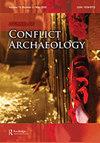纳粹分子,我们仍然讨厌那些家伙!
IF 0.6
0 ARCHAEOLOGY
引用次数: 0
摘要
在《冲突考古杂志》第4卷中,托尼·波拉德教授和我发表了一篇题为“纳粹,我们恨那些家伙!”(波拉德和班克斯,2008年)。这在很大程度上是托尼的作品,它审视了否认大屠杀的世界,并考虑了在处理道德上令人反感的思想时出现的言论自由问题。今天,它是2008年情况的快照,如果没有其他原因的话,它很有趣,因为它显示了2008年的情况有多好。否认大屠杀在很大程度上是一个边缘问题,尽管在当时的伊朗总统马哈茂德·艾哈迈迪内贾德的领导下,中东反犹太主义和否认大屠杀的热潮令人担忧。他最近(2006年)举行了一次“审查大屠杀全球愿景国际会议”,这基本上只是一个平台,让否认者在一个公开论坛上以体面的外表展示他们的想法(Pollard和Banks,2008,vii)。尽管如此,这些想法在2008年成为主流的风险并不明显。快进到近15年后的2022年,我们不能那么确定否认大屠杀是否处于边缘。自2008年以来,在狂热的政治气候中,言论自由问题已成为武器。自2008年以来,世界发生了巨大变化。那一年,金融资本主义似乎崩溃了,银行业从银行家的愚蠢行为所造成的灾难中拯救了出来,这些灾难是由大量的公共资金投入造成的,这让世界各地的公共财政都难以应对。在此之后,紧缩政策成为英国生活的一部分,至少在可预见的未来是这样。中东仍然处于危机之中,以色列一直是潜在的爆发点;叙利亚爆发了一场漫长而血腥的内战,伊斯兰国哈里发国显然势不可挡,在伊拉克和叙利亚横行霸道,其分支机构作为有组织的恐怖主义在穆斯林世界造成了严重破坏。这与困扰世界的经济混乱一起,引发了一波又一波的移民潮,人们逃离饥饿、经济崩溃和暴力冲突。随着难民从中东和非洲涌入,他们的目的地往往是欧洲。在这里,他们面临着不确定的欢迎,因为传递包裹的国际游戏意味着每个国家都口头上支持从难民中分一杯羹,而一些国家则尽其所能避免分一杯。这在欧盟内部造成了紧张局势,尤其是在默克尔总理保持德国边境开放的情况下,德国人似乎接收了最多的难民。相比之下,英国只拿走了我们能逃脱惩罚的很少的东西。与此同时,民族主义在整个欧洲的国家政治中变得越来越明显。在乌克兰,2014年的迈丹革命使主要亲西方的乌克兰人口和主要亲俄罗斯的俄语人口之间的紧张关系达到了顶点。这导致了一个具有乌克兰民族主义观点的政府,其中包括极右翼极端分子。政权更迭的结果是与东部分离主义者爆发内战,并被俄罗斯吞并克里米亚。民族主义言论在双方都非常明显,《新冲突考古杂志2022》第17卷第3期147–154页也是如此https://doi.org/10.1080/15740773.2022.2201161本文章由计算机程序翻译,如有差异,请以英文原文为准。
Nazis, we still hate those guys!
In Volume 4 of the Journal of Conflict Archaeology, Professor Tony Pollard and I produced an editorial entitled ‘Nazis, We Hate Those Guys!’ (Pollard and Banks 2008). Largely the work of Tony, it was a look at the world of Holocaust denial and a consideration of the issues of free speech that arise when dealing with ideas that are morally repugnant. It serves today as a snapshot of the situation in 2008 and is interesting if for no other reason because it shows how much better things were in 2008. Holocaust denial was very much a fringe issue, albeit with a worrying upsurge of antisemitism and Holocaust denial in the Middle East, led largely by then-President of Iran Mahmoud Ahmadinejad. He had recently (2006) held an ‘International Conference to Review the Global Vision of the Holocaust’, which was basically just a platform for deniers to present their ideas in a public forum with a veneer of respectability (Pollard and Banks 2008, vii). Despite this, there was no apparent risk that such ideas might become mainstream in 2008. Fast forward to 2022, nearly 15 years later, and we cannot be as certain that Holocaust denial is out in the far fringes. Issues of free speech have become weaponised in the febrile political climate that has developed since 2008. Since 2008, the world has changed dramatically. That was the year that finance capitalism appeared to implode, and the banking world was saved from the disasters that bankers’ follies had created by huge inputs of public money that left public finances across the world struggling to cope. In the wake of this, austerity became a part of life in Britain at least for the foreseeable future. The Middle East remained in crisis, with Israel a constant potential flashpoint; it was joined by a long and bloody civil war in Syria and the apparently unstoppable growth of the ISIS caliphate that murdered its way across Iraq and Syria, with offshoots creating havoc across the Muslim world as organised terrorism. This, along with the economic chaos that afflicted the world, caused waves of immigration as people fled starvation, economic collapse, and violent conflict. As the refugees streamed away from the Middle East and Africa, their destination tended to be Europe. Here they faced an uncertain welcome as an international game of pass the parcel meant that each nation gave lip service to the idea of taking a share of the refugees while some did everything that they could to avoid taking a share. It created tensions within the EU, especially as the Germans seemed to be taking the most refugees as Chancellor Merkel kept Germany’s borders open. Britain, in contrast, took as few as we could get away with. At the same time as all this, nationalism was becoming more and more apparent within national politics across Europe. In Ukraine, the tensions between the largely pro-Western Ukrainian population and the largely pro-Russia Russian-speaking population came to a head with the Maidan Revolution of 2014. This resulted in a government with a nationalist Ukrainian perspective that included extremists from the far-right. The result of the change in regime was a civil war with separatists in the east and the annexation of Crimea by Russia. Nationalist rhetoric was very noticeable on both sides, as were neoJOURNAL OF CONFLICT ARCHAEOLOGY 2022, VOL. 17, NO. 3, 147–154 https://doi.org/10.1080/15740773.2022.2201161
求助全文
通过发布文献求助,成功后即可免费获取论文全文。
去求助
来源期刊

Journal of Conflict Archaeology
ARCHAEOLOGY-
CiteScore
0.80
自引率
50.00%
发文量
8
期刊介绍:
The Journal of Conflict Archaeology is an English-language journal devoted to the battlefield and military archaeology and other spheres of conflict archaeology, covering all periods with a worldwide scope. Additional spheres of interest will include the archaeology of industrial and popular protest; contested landscapes and monuments; nationalism and colonialism; class conflict; the origins of conflict; forensic applications in war-zones; and human rights cases. Themed issues will carry papers on current research; subject and period overviews; fieldwork and excavation reports-interim and final reports; artifact studies; scientific applications; technique evaluations; conference summaries; and book reviews.
 求助内容:
求助内容: 应助结果提醒方式:
应助结果提醒方式:


